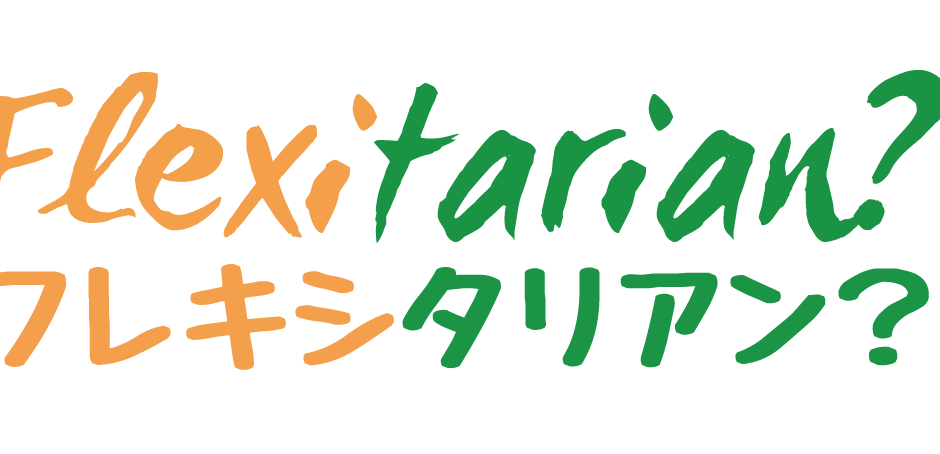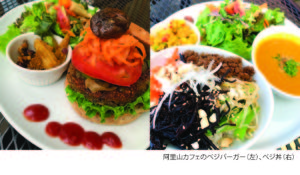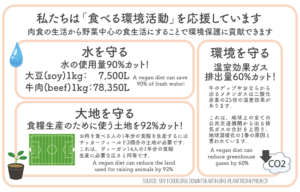- ニュース
‘フレキシタリアン’ってご存知ですか?
Flexitarians in Japan

近年日本では「植物性/プラントベース」という言葉が広く使われるようになり、そう言った製品も少しずつ増えてきました。特に、東京オリンピックの開催が決まってからインバウンド需要に対応しようとする飲食店が増えたこと、また新型コロナウイルスが動物を介して広まったのではないか、という見解が出てきたことなどが後押しとなったとも考えられます。それに伴い、ベジタリアン/ヴィーガンという言葉も目にする機会が多くなってきたように思いますが、国内外で今一番増えているのは ‘フレキシタリアン’ だと言われています。
Recently the word “plant-based” has started popping up in Japan and finding meat-free products is becoming easier. After Tokyo was announced as the Olympic city in 2013, many cafes and restaurants started to consider carrying veggie/vegan options. Fears around the new corona virus and its possible transmission from animals also helped power this interest in meat alternatives. For these reasons, we see the population of vegetarians and vegans increasing in Japan.
その名からも想像できる通り「フレキシブル(柔軟)なベジタリアン(菜食)」という意味で、日本語では ‘ゆるベジタリアン’ とも言われています。厳格なイメージのあるベジタリアン/ヴィーガンとは違い、肉・魚の消費を減らし植物性の食品を積極的に食べるという食生活で、普段は菜食生活を心がけながらたまに肉・魚を食べるというベジタリアンに近いフレキシタリアンもいれば、普段は好きなものを食べつつ週に1日は肉・魚を食べない日を設けるというフレキシタリアンもいます。
For strict vegetarians / vegans it is noticeable that many new plant-based options, especially those in main stream supermarkets, are aimed at a Flexitarian diet. There are often meat or fish extracts used for flavoring or egg is used as a binder. As a path towards reducing the world’s consumption of meat though it is an important first step. This type of ‘flexible vegetarian’ is called ゆるベジ(yuru veggie) in Japan.

もし、No Meat Monday(肉なしの月曜日)と呼ばれるような週1度だけ肉を食べない『週いちベジ』をするとどういった良いことがあるのでしょう。まず、お肉を食べないということは植物性たんぱく質(豆や雑穀)を多く摂るということになります。そうすると必然的に食物繊維や鉄分などたんぱく質以外の栄養素も身体に取り入れることになります。また、お肉(特に赤身肉)の食べ過ぎは心臓病などを引き起こす原因との研究結果もあり、消費を減らすことは単純にそういったリスクを下げることにも繋がるでしょう。週いちベジの効果は私たちの身体への好影響だけではありません。お肉となる動物を育てるには沢山の飼料(豆やとうもろこし、穀物)と、水が必要となります。水に至っては、実際に動物を洗ったり飲ませたりするだけでなく、飼料となる作物を育てる過程にも大量に使用されているため、1kgの牛肉を生産するのには20,600Lの水が消費されている計算になります。週いちベジの効果の一つとして忘れてはいけないのは、温室効果ガスの排出量も削減されるということです。少し想像しづらいかもしれませんが、牛・豚のゲップやおならにはメタンガスが含まれています。ふん尿が堆肥化する際にもメタンガスは出ますし、ふん尿を処理する過程では亜酸化窒素が出ると言われています。メタンガスは二酸化炭素の25倍、亜酸化窒素は298倍も温室効果があります。
If you’re thinking of reducing your meat consumption, how about trying a meat-free day once a week, an idea put forward by Paul McCartney’s “No Meat Monday?”. Start by trying to eat more beans/grains for proteins; that means you will also increase your intake of fiber and decrease the amount of saturated fat you consume. There are many studies that show that red meat can be a cause of heart disease, so eating less red meat can reduce the risk. Having a meat-free day a week is not only good for our health but also for the environment. In order to raise livestock we need both the land for the animals to live on, but also to grow crops for their fodder and water is needed directly for the animals but also to raise the crops they will eat. It has been calculated that to produce 1kg of beef, 20,600L of water, directly and indirectly, are used. Greenhouse gas emissions would also be reduced if the numbers of livestock were reduced. Methane gas, which has a x25 greenhouse effect compared to CO2, can be found in the burps and flatulence of livestock, and nitrous oxide, which is even worse for the environment, is released when breaking down manure.

自身の健康のことや環境のことを考えながら、自分に合ったレベルで菜食を取り入れることができるのがこのフレキシタリアンの良いところです。菜食生活が環境に良いことはわかりつつも、なかなかお肉やお魚を食べることがやめられないという方、ベジタリアン/ヴィーガンに興味があるもののいきなり切り替えられるか不安という方、様々いらっしゃるかと思います。いきなりハードルを高く設定してしまわずに、まずはフレキシタリアン、週いちベジから初めてみてはいかがでしょうか?
If you think about both your health, and the health of the planet, switching to a flexitarian lifestyle isn’t such a big price to pay. Don’t be intimidated by hard core vegans; even the smallest step is fantastic. Cutting meat out of one meal a week is a great place to start.





